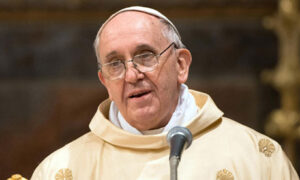Becky Kospanova
 On March 13, 2013 a conclave of 115 Catholic cardinals elected a new leader of Catholics worldwide – Pope Francis. The election had to be held after nearly unprecedented and most certainly unexpected resignation of Pope Benedict XVI on February 28, 2013 who willingly stepped down because of his failing health. Thus, an Argentinean cardinal Jorge Mario Bergoglio, the archbishop of Buenos Aires, became the 266th pontiff of Roman Catholic Church. Of course, the news about just elected Pope immediately spread all over the world and, considering that there are more than one billion Catholics in the world nowadays, everybody was eager to learn more about him and tried to predict what Church policies new pope will embrace during his papacy.
On March 13, 2013 a conclave of 115 Catholic cardinals elected a new leader of Catholics worldwide – Pope Francis. The election had to be held after nearly unprecedented and most certainly unexpected resignation of Pope Benedict XVI on February 28, 2013 who willingly stepped down because of his failing health. Thus, an Argentinean cardinal Jorge Mario Bergoglio, the archbishop of Buenos Aires, became the 266th pontiff of Roman Catholic Church. Of course, the news about just elected Pope immediately spread all over the world and, considering that there are more than one billion Catholics in the world nowadays, everybody was eager to learn more about him and tried to predict what Church policies new pope will embrace during his papacy.
Pope Francis is a pope of many “firsts.” He is the first pope from the Americas and the first pope in modern times who is not from Europe (in ancient times, there were popes from Syria, Bethlehem, Jerusalem, and modern-day Libya). He is the first pope from the Jesuit order, the largest society within Catholic Church, which is best known for its promotion of educational institutions and whose members take vows of poverty, obedience, and chastity. He is the first to choose the name Francis in honor of St. Francis of Assisi, the servant of poor and destitute (that is why Pope Francis does not have a number after his name). During his first appearance on the balcony in St. Peter’s Square, he broke Vatican tradition by asking the crowd to pray for him instead of offering his blessings and refused to step up on the platform to elevate himself above the cardinals.
In fact, 76 years old Jorge Mario Bergoglio, son of poor Italian immigrants, has always been a man of great faith and humility. It is a well-known fact that he has always led modest life – while serving as the archbishop of Buenos Aires, he chose to live in an apartment instead of palace, rode public transportation refusing chauffer-driven limousine, and cooked his own meals. He is deeply concerned with the problems of poverty and social justice, and he even washed feet of AIDS patients during his visit to the hospital. As such, many people predict that Pope Francis will put great emphasis on conquering poverty and social injustices during his papacy. Moreover, some analysts argue that, unlike his predecessor Pope Benedict XVI, he will be more open to dialogue with people of different faiths. It is believed that he is sympathetic towards Jewish people and he even held common ceremony with Evangelical priest.
Still, Catholic Church today faces many problems due to numerous sex abuse scandals, corruption and infighting within the Church, and declining numbers of followers. As such, there is a lot to be done to regain the prestige of the Church. Many people argue that Vatican has consolidated all power and argue that local bishop conferences, diocese and churches need to recover some of it. However, nobody is yet sure as to what new pope’s position on this problem is. Being a conservative, Pope Francis opposes gay marriage, abortion, adoption of children by same-sex couples, and ordination of women. Consequently, it is hardly feasible that any steps will be taken in these areas. Also, many people point out that during so-called Dirty War (1976-1983) when Argentina was under military dictatorship and when as many as 30 000 people were jailed or simply disappeared for holding opposing political views, Catholic Church sided with the government. However, in an interview in 2010 Bergoglio defended the Church by stating that they helped many prosecuted people during that time.
Still, by appointing a pope from Latin America, Catholic Church demonstrated that it recognizes the growth of Catholicism in areas outside Europe such as Latin America, Africa, and Asia. As such, some changes might very well be

